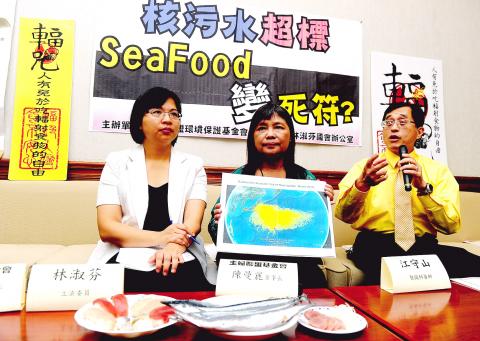The Homemakers United Foundation yesterday urged the government to enforce stricter radiation inspections on imported food.
The group issued the call following the confirmation by Tokyo Electric Power Co, operator of Japan’s Fukushima Dai-ichi nuclear power plant, that 300 tonnes of radiation-contaminated water from a steel tank had leaked into groundwater and possibly into the sea.
Foundation president Chen Man-li (陳曼麗) said radiation leakage from Fukushima has contaminated the seawater and nearby soil, and while many Taiwanese like to eat seafood, the government has not taken any precautions against the importation of possible contaminated food from Japan.

Photo: CNA
“It’s been two years since the Fukushima Dai-ichi nuclear disaster, but the total number of samples [of food products imported from Japan tested for radiation levels] is only 40,000, while Hong Kong’s authorities have already tested more than 150,000 samples,” she said, adding that both South Korea and Hong Kong immediately release their reports on contaminated food to the public.
Democratic Progressive Party (DPP) Legislator Lin Shu-fen (林淑芬) said that government statistics showed that the number of food samples tested during a week in Taiwan (202 from Aug. 19 to Aug. 25 this year) is fewer than the number tested during one day in Hong Kong (299 between 12am Aug. 19 and 12am on Aug. 20), and that the permitted level in Taiwan was even raised last year.
Chiang Shou-shan (江守山), a nephrologist at Shin-Kong Wu Ho-Su Memorial Hospital, suggested that the public avoid eating migrating fishes, such as tuna, flounder and greenling, because they may have higher levels of radiation accumulated in their bodies.
Although some forms of radiation can be blocked by wearing an aluminum or radiation protection suit, our stomachs remain unprotected, he said, adding that radioactive substances in food may continue to damage the body for a long time after consumption.
Meanwhile, in related developments, the DPP, noting the state-run Taiwan Power Co’s (Taipower) refusal to arrange former Japanese prime minister Naoto Kan’s visit to the No. 1 reactor at the Guosheng Nuclear Power Plant in Wanli District (萬里), New Taipei City (新北市), because of Kan’s anti-nuclear position, said yesterday that Taipower seemed to be implying that only those who supported nuclear energy would be welcome to visit power plants.
“The refusal highlighted Taipower’s pro-nuclear position and its violation of diplomatic protocol,” DPP spokesperson Lin Chun-hsien (林俊憲) said.
The President Ma Ying-jeou (馬英九) administration and Taipower have both violated Article 23 of the Basic Environment Act (環境基本法), which stipulates that the government must make plans to gradually achieve the goal of becoming a nuclear-free country, Lin said.
Kan is slated to visit Taiwan from Sept. 12 to Sept. 15 for a series of events to express his opposition to nuclear power.
Additional reporting by Chris Wang and CNA

Alain Robert, known as the "French Spider-Man," praised Alex Honnold as exceptionally well-prepared after the US climber completed a free solo ascent of Taipei 101 yesterday. Robert said Honnold's ascent of the 508m-tall skyscraper in just more than one-and-a-half hours without using safety ropes or equipment was a remarkable achievement. "This is my life," he said in an interview conducted in French, adding that he liked the feeling of being "on the edge of danger." The 63-year-old Frenchman climbed Taipei 101 using ropes in December 2004, taking about four hours to reach the top. On a one-to-10 scale of difficulty, Robert said Taipei 101

Nipah virus infection is to be officially listed as a category 5 notifiable infectious disease in Taiwan in March, while clinical treatment guidelines are being formulated, the Centers for Disease Control (CDC) said yesterday. With Nipah infections being reported in other countries and considering its relatively high fatality rate, the centers on Jan. 16 announced that it would be listed as a notifiable infectious disease to bolster the nation’s systematic early warning system and increase public awareness, the CDC said. Bangladesh reported four fatal cases last year in separate districts, with three linked to raw date palm sap consumption, CDC Epidemic Intelligence

Taiwanese and US defense groups are collaborating to introduce deployable, semi-autonomous manufacturing systems for drones and components in a boost to the nation’s supply chain resilience. Taiwan’s G-Tech Optroelectronics Corp subsidiary GTOC and the US’ Aerkomm Inc on Friday announced an agreement with fellow US-based Firestorm Lab to adopt the latter’s xCell, a technology featuring 3D printers fitted in 6.1m container units. The systems enable aerial platforms and parts to be produced in high volumes from dispersed nodes capable of rapid redeployment, to minimize the risk of enemy strikes and to meet field requirements, they said. Firestorm chief technology officer Ian Muceus said

MORE FALL: An investigation into one of Xi’s key cronies, part of a broader ‘anti-corruption’ drive, indicates that he might have a deep distrust in the military, an expert said China’s latest military purge underscores systemic risks in its shift from collective leadership to sole rule under Chinese President Xi Jinping (習近平), and could disrupt its chain of command and military capabilities, a national security official said yesterday. If decisionmaking within the Chinese Communist Party has become “irrational” under one-man rule, the Taiwan Strait and the regional situation must be approached with extreme caution, given unforeseen risks, they added. The anonymous official made the remarks as China’s Central Military Commission Vice Chairman Zhang Youxia (張又俠) and Joint Staff Department Chief of Staff Liu Zhenli (劉振立) were reportedly being investigated for suspected “serious